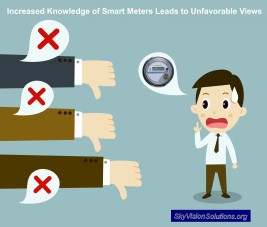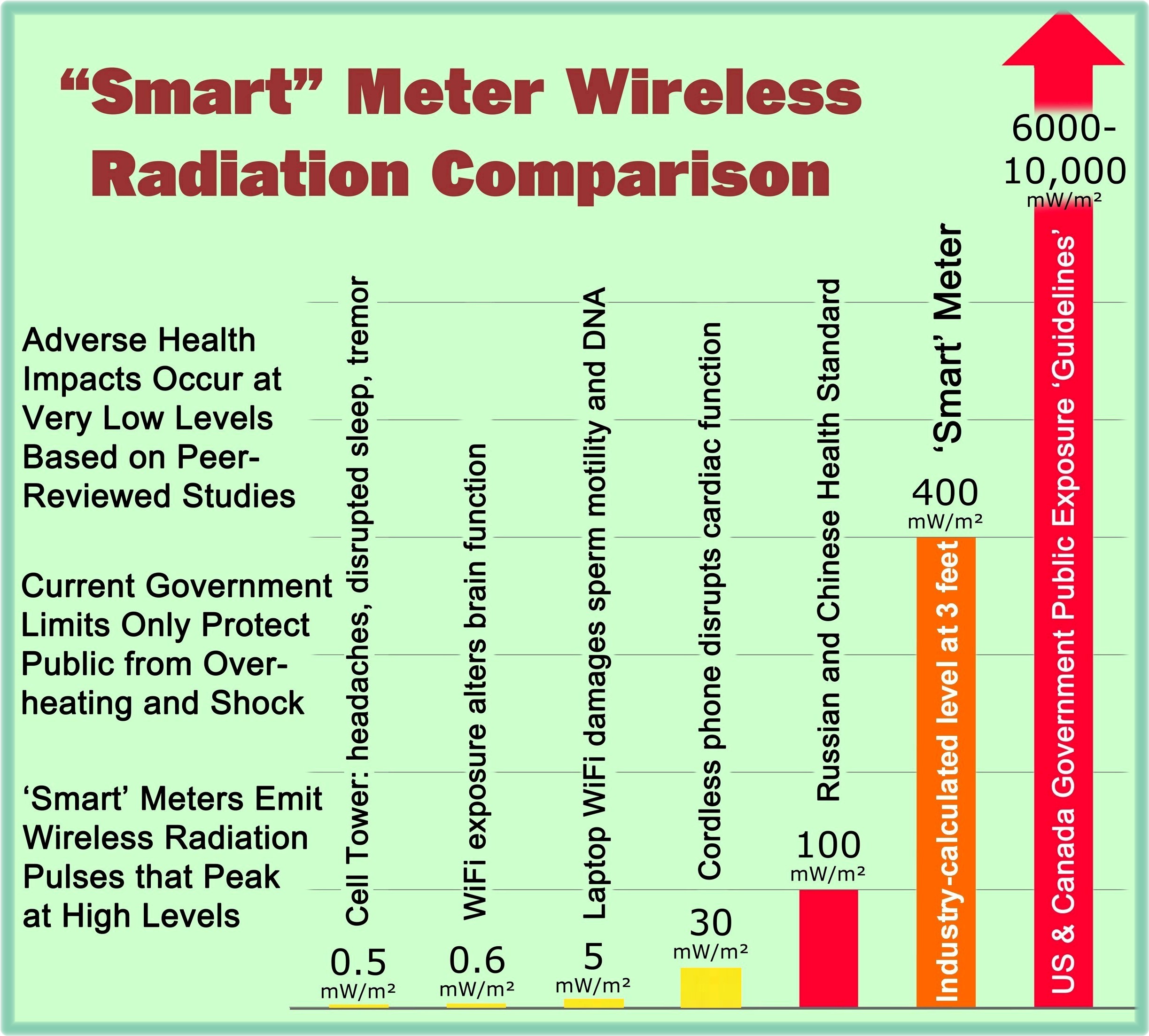 by K.T. Weaver, SkyVision Solutions
by K.T. Weaver, SkyVision Solutions
Governments and corporations are forcing utility ‘smart’ meters onto consumers’ homes saying that they give consumers control over their own energy bills. This propaganda-like message is quite misleading and more importantly completely ignores the tremendous financial, health, safety, privacy, and cybersecurity risks that smart meters impose on consumers and society [1].
At this website through a variety of articles, many times highlighting published studies, we have shown how smart meter threats and risks far outweigh purported benefits. The great advantage that smart meter proponents have had in their fast-paced deployments is that the majority of consumers are generally not even yet knowledgeable on what is meant by the term “smart meter,” and consumers also tend to trust that something cleverly labeled as “smart” must be beneficial.
The results of a new study, however, provide renewed hope that consumers will eventually reject smart meter technology in spite of governments and corporations which hype the purported benefits and are silent on the risks. The newly published article is entitled, “Understanding and Beliefs about Smart Energy Technology” [2]. The study demonstrates that as consumers learn about smart meter technology, they become more aware of the potential risks and therefore have increased concerns about the negative impacts that smart meters may have on their lives.
Highlights of the Study:
- American survey respondents have very little knowledge about the smart grid.
- Exposure to smart meters increases this knowledge.
- Knowledge and exposure are associated with negative perceptions of smart meters.
- Smart meters are seen more negatively than the grid as a whole.
- Negative reactions and unfavorable views of smart technologies among consumers are rising.
From the Abstract of the Study:
“The smart grid has been hailed for its potential to address a wide range of problems with current electricity infrastructure, with improvements expected in consumer awareness of energy use, energy efficiency, renewable energy distribution, and reliability of service. …
However, a vocal minority has expressed concerns about the health, privacy, and cost impacts of the smart grid. Here we use a convenience sample of online respondents to quantitatively examine the American lay public’s level of knowledge about smart meters and the smart grid and show that a majority of respondents are wholly unfamiliar with smart energy technology.
Furthermore, we demonstrate that, in contrast to information-deficit model expectations, knowledge of and exposure to smart meters do not necessarily lead to acceptance. On the contrary, knowledge and exposure is associated with increased concerns about negative impacts of these technologies.”
Quoting Portions of the Study:
“Although those living in high-penetration states were more knowledgeable about SMs [smart meters] and the smart grid, they perceived less benefit from this technology than their counterparts in low-penetration states. Therefore, exposure to smart technology seems to result in skepticism about the benefits of this technology rather than positive attitudes or acceptance.”
“[M]ore knowledgeable people thought the devices were more harmful to health.”
“[T]rends showed that the greatest concerns about security and privacy were found among knowledgeable respondents living in HP [high-penetration] states.”
“The more people thought SMs mitigated global warming, the more likely they were to adopt them. However, knowledgeable people from HP states were less optimistic about the devices’ effect on global warming, making them less likely to adopt meters compared to participants from LP [low-penetration] states.”
“Overall, [evidence suggests that] consumers are unconvinced of the relative advantages touted by industry and environmental advocates of SMs over analog meters.”
Quoting the Conclusion of the Study:
“Negative reactions to smart technologies are more prevalent than industry or government would like and market research shows these unfavorable views are rising.”
“Differences in consumer perceptions of SMs and the smart grid have implications for policy. The distinction may reflect NIMBY (not in my backyard) tendencies to support projects or technologies in the abstract, but to oppose them when they are brought too close to home, or in this case, attached to one’s home.”
“Similar differentiation has been shown in qualitative SM research and in household energy consumption. This does not mean that such responses are selfish, simply that although the benefits of these technologies are community-wide, the costs become apparent to consumers when smart technology is brought into their own home.”
“For example, those with more knowledge had stronger health concerns (e.g., fears of wireless radiation), which are directly applicable to SMs in homes and less so to the smart grid as a whole. This is particularly important given the vocal health-driven opposition to smart technology. Efforts to systematically evaluate the health effects of SMs may lessen these concerns over time, but could create new frontiers for debate. Changing policies by offering the option of wired (rather than wireless) SMs and communicating the personal health benefits of the smart grid (via reduced coal-based air pollution) is likely a more productive way to balance fears in this domain in the short-term.”
Unfortunately, I need to point out at this juncture that the authors of the newly published study are generally following a narrative that smart meters actually do provide a net-positive benefits for communities even though individual consumers may have “fears” about them and that these fears increase as consumers gain more knowledge. The authors then recommend that one way to alleviate individual health concerns over smart meters may be to point to reduced coal-based air pollution. This argument alas depends on claims regarding reduced air pollution actually being true in order to “balance fears.”
Similarly, on the subject of privacy, the authors of the study write:
“Familiarity with smart technology was associated with increased worry about security. Westerners perceive their home as private spheres over which they (not third parties) should have control, and security concerns about household SMs may be equated with privacy (indeed, privacy concerns followed the same pattern). This suggests that US consumers — like their UK counterparts — may be unenthusiastic about remote control of residential energy systems. Providing guidelines to consumers and utilities about what information meters may (and may not) record as well as rules for how personal data managed is are also important.”
We “westerners perceive” our homes as private spheres over which we should have control. Silly us. Is there a question on whether this should be true? Isn’t privacy and control in our homes a matter of having citizen rights? In this instance the authors recommend that consumers be provided information in a way that downplays the privacy and security risks for those who perceive that they should have privacy and security in the home.
Summary
The published study highlighted by this article attempts to inform regulators and utilities that in order to have successful smart meter deployments they need to better understand and address “consumer perceptions” in order to implement customer-based programs enabled by the smart grid. To do so, the authors conclude that concerns over “the personal effects of smart technologies in the home” must be addressed “rather than simply system-wide benefits.”
I agree that consumer “personal” concerns need to be addressed, but they also need to be acknowledged as representing legitimate concerns that are based upon real threats and risks posed by smart grid technology, not just as a problem with messaging.
The good news is that the study documents quantitative research that consumer concerns over smart meter technology increase, not decrease, as they learn more about it. It is the purpose of this website to be continued a source of objective information from which consumers can further increase their awareness of the threats and risks posed by smart meters and smart grid technology.
Notes and References for this Article
[1] SkyVision Solutions has previously summarized consumer and societal risks associated with smart meter deployments as:
- The financial burden imposed by smart meters where most consumers will suffer a “net loss.”
- Privacy invasions due to granular collection of energy usage data which represents a “gold mine” to others.
- Potential health risks and actual adverse health effects caused by the additional electrosmog created by the smart meters and their associated infrastructure.
- The increased risk of household fires due to smart meter safety issues and ‘catastrophic failures’ that are expected with smart meters as opposed to traditional usage meters.
- Societal implications of smart grid and smart meter cybersecurity threats which can result in catastrophic events affecting widespread areas of the electric grid.
In addition, for those few consumers who might be motivated in an attempt to use smart meters to somehow conserve energy, they will pay a yet to be quantified price related to losing control over one’s appliances, quality of life, comfort, and health.
[2] “Understanding and Beliefs about Smart Energy Technology,” by Kaitlin T. Raimi and Amanda R. Carrico, Energy Research & Social Science, Volume 12, February 2016, Pages 68–74; available at http://www.sciencedirect.com/science/article/pii/S2214629615301018





Here is Sacramento, SMUD has decided that even though they originally published that there were “only six smart meter transmissions per day” and we showed them it was actually 13,381 transmissions per day, to which they admitted, SMUD would not go back and disabuse the customer. Probably because it would lead to customers demanding the analog meter back.
Choice in a democracy is paramount ! Everything comes after !